
The future is already here!

The progressive C/C++ development system for the Amiga's future.
This new and improved version of StormC has been enhanced in the areas of code optimization, source file management, and debugging. Organization and handling of projects have also been brought closer to perfection.
Press comments:
Version 1.1 was already given high marks by the press.
"... StormC is a good choice with an eye on the future as well!"
"... a full step ahead!" Winner in head-to-head comparison!
".. you cannot go wrong with the highly polished StormC!"
Rated overall: 92%
Hierarchical Projects![]()
The intuitive project management pioneered by StormC has been extended with so-called Hierarchical Projects, allowing you to include multiple projects in a single "superproject". This feature can be used to combine projects for different processor types or alternative operating systems, letting you easily recompile all target versions even of a single program module. Another possible use is to automatically update any parts of the program that are being maintained as shared libraries.
Such projects can be created just as easily as before. Anything can be bundled into a project using drag-and-drop or through an ASL requester. Multiple selection is still supported, naturally.
External control through ARexx![]()
Another highlight in the improved Project Manager is its ability to start external programs through ARexx while compiling. Interfacing to a revision control system (RCS) or creating a Locale catalogue file is an easy task using this option. Invoking a preprocessor or compiler for another language, taking into account any dependencies between existing and generated files, is now also possible thanks to this feature.
GoldED 4 - The Professionals' Choice![]()
Starting with version 2.0 of the StormC package, two editors are included with the compiler. Although StormED 2 got an overhaul, only few options have been added. Rather than extending StormED we decided to simply integrate GoldED, which has long established itself as the favourite text editor among professionals, into the StormC package. You will now have a free choice between StormED and GoldED.
The environment can cooperate with GoldED just as tightly as it already did with StormED, and all options of the environment are still available from the GoldED window.
One of the major features of our system is that sources can be debugged from the normal text editor instead of using a separate debugger window. This is also possible with GoldED: When the debugger is started, GoldED will show a breakpoints column directly to the left of the source text in the same window.
Persistent breakpoints![]()
Many StormC users requested the possibility to have the breakpoints that were set in a previous debugging run reappear the next time that the debugger is started. This is no problem for GoldED. Saved breakpoints are preserved even when the source text is modified. This can be an invaluable help for larger projects with many source files.
Disassembler and CPU register display![]()
Assembly-language output is essential for full inspection of the program produced by the compiler. For this reason the new debugger is able to show the program as an assembler listing as well as in C/C++ source code. This window will let you set breakpoints at any location in memory. This gives you full control over bug hunts in your code, or even in ROM!
Stack checking![]()
A so-called backtrace can also be tremendously useful for finding bugs. This is made possible by the stack window's ability to document nested function calls.
Profiler![]()
An absolute novelty is the newly-added code profiler. After developing a program, this tool is used to find the places in your code where most execution time is spent, and help you concentrate your optimization efforts on those places where they will do the most good. It does this by measuring the execution times of each function in the program while it is running.
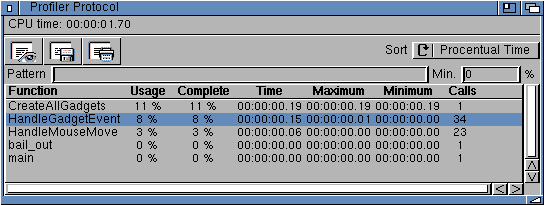
The product of this procedure is a table, which may be sorted by your own criteria, containing each function's name, the number of times it has been called, and the time spent in those calls. This makes optimizations to your program directly visible and quantifiable.
All features of the debugger and profiler described above can be used without the need to change the program. The necessary extra information is written to separate debug files rather than added to the actual program binary.
The consequence for you is that there is no need to recompile your program after each debugging or profiling run just to get rid of the extra information in the executable. This will help prevent nasty surprises.
StormC is an integrated development system containing all development tools imperative for efficient software engineering: editor, compiler, linker, debugger and RunShell with many outstanding features.

With the toolbar you have quick access to all important functions.
The heart of StormC is its visual project manager which manages every part of the project, e.g. sources, headers, libraries, documents and binaries.
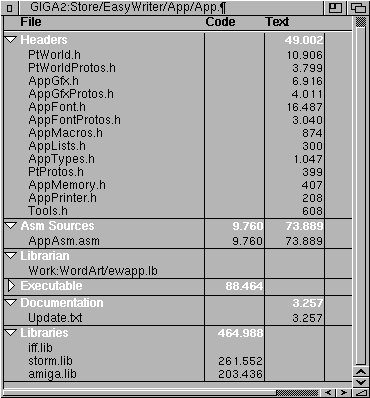
The project manager of StormC.
The very fast editor StormED displays keywords colourfully for increased readability and a first visual syntax check. Starting with version 2.0 of the StormC package, two editors are included with the compiler. Although StormED 2 got an overhaul, only few options have been added.
GoldED 4 - The
Professionals' Choice![]()
Rather than extending StormED we decided to simply integrate GoldED, which has long established itself as the favourite text editor among professionals, into the StormC package. You will now have a free choice between StormED and GoldED.
The environment can cooperate with GoldED just as tightly as it already did with StormED, and all options of the environment are still available from the GoldED window.
One of the major features of our system is that sources can be debugged from the normal text editor instead of using a separate debugger window. This is also possible with GoldED: When the debugger is started, GoldED will show a breakpoints column directly to the left of the source text in the same window.
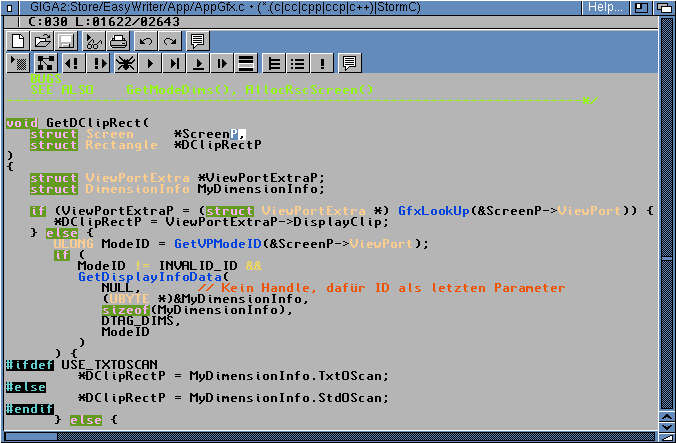
The StormC compiler handles ANSI C and C++ sources and generates optimised code for the whole Motorola 68xxx family (including 68060 and 68881/882).

Compiler options of StormC.
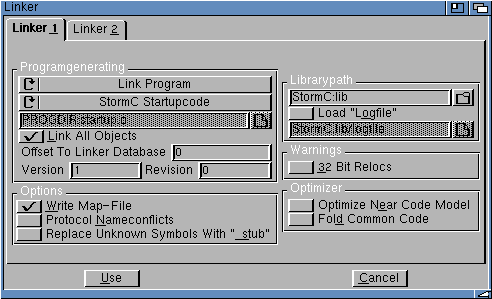
One of the two Linker options requesters of StormC.
The RunShell is a powerful run-time system that monitors the running application and prevents it from crashing the system. It also offers resource tracking and it can start the source-level debugger during (!) run-time of the program.
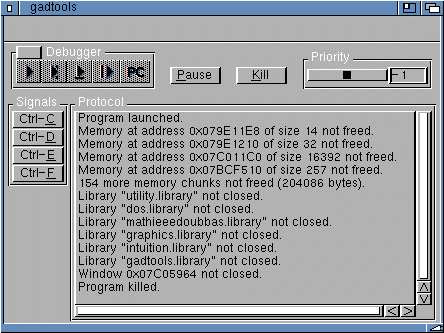
The RunShell of StormC.
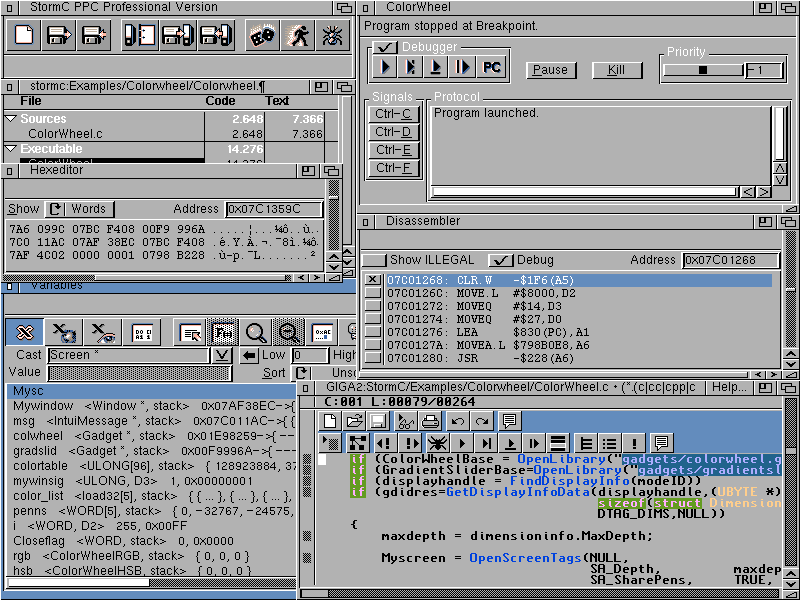
The Source-Level-Debugger of StormC. With the Inspect
window you can watch and change varibles and structures. This example shows
a screen structure.
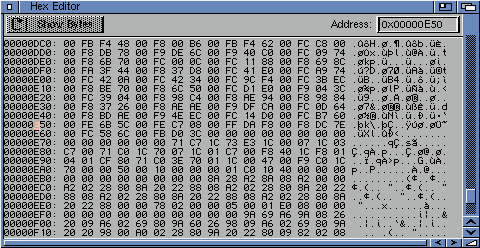
HEX-Editor.
(![]() Features marked
by this are new in version 1.1.)
Features marked
by this are new in version 1.1.)
(![]() Features marked
by this are new in version 2.0.)
Features marked
by this are new in version 2.0.)
![]() Management of Multiple
Projects
Management of Multiple
Projects
![]() Hierarchical Projects
with Section Folding
Hierarchical Projects
with Section Folding![]()
![]() Drag & Drop
Drag & Drop
![]() Automatic File Type
Recognition (Sources, Headers, Libraries, Docs, AmigaGuide, Binaries ...)
Automatic File Type
Recognition (Sources, Headers, Libraries, Docs, AmigaGuide, Binaries ...)
![]() Toolbar with Tooltips
(Help Function)
Toolbar with Tooltips
(Help Function)
![]() Fully Configurable
(>50 Option Requesters)
Fully Configurable
(>50 Option Requesters)
![]() GoldED Support
GoldED Support
![]() New Options
New Options
![]() New GUI
New GUI
![]() Two Editors: GoldED
4 and StormED 2
Two Editors: GoldED
4 and StormED 2![]()
![]() Multi-window Editor
Multi-window Editor
![]() Syntax Colouring
Syntax Colouring
![]() User-defined Dictionary
User-defined Dictionary
![]() Perfect Source Structuring
Perfect Source Structuring
![]() Unlimited Undo/Redo
Unlimited Undo/Redo
![]() Fast Search & Replace
Fast Search & Replace
![]() Bracket Matching
Bracket Matching
![]() New Colour Controls
New Colour Controls
![]() New Project Template
New Project Template
![]() 2-in-1 Compiler:
ANSI-C & C++ (AT&T 3.0)
2-in-1 Compiler:
ANSI-C & C++ (AT&T 3.0)
![]() Exception Handling
Exception Handling
![]() Templates
Templates
![]() High-Speed Compiler
High-Speed Compiler
![]() Fast Turn-Around
Fast Turn-Around
![]() Code Generation for
all Motorola 68xxx (incl. 68060, 68881/68882)
Code Generation for
all Motorola 68xxx (incl. 68060, 68881/68882)
![]() Single-Pass Compiler
Single-Pass Compiler
![]() Powerful Inlining
Powerful Inlining
![]() Highly Compatible with
SAS/C, DICE, Aztec C, MaxonC, GCC
Highly Compatible with
SAS/C, DICE, Aztec C, MaxonC, GCC
![]() Pre-Compiled Headers
Pre-Compiled Headers
![]() Multiple-Pass Optimiser
Multiple-Pass Optimiser
![]() New Keyword "__saveds"
New Keyword "__saveds"
![]() Very Fast Linking
Very Fast Linking
![]() Near-Code Optimiser
Near-Code Optimiser
![]() Type-Safe Linking
Type-Safe Linking
![]() Generates ROM Code
Generates ROM Code
![]() Easy Generation of
Shared Libraries
Easy Generation of
Shared Libraries
![]() Compatible to SAS/C-
and MaxonC Libraries
Compatible to SAS/C-
and MaxonC Libraries
![]() Code Folding (Optimisation
at Linking)
Code Folding (Optimisation
at Linking)
![]() Linking of Binaries
Linking of Binaries
![]() Simple Creation
of Linker Libraries
Simple Creation
of Linker Libraries
![]() Easy Generation of
Library Sets
Easy Generation of
Library Sets
![]() Resource Tracking
Resource Tracking
![]() Controlled Program
Interrupt
Controlled Program
Interrupt
![]() Any Time Start of Debugger
Any Time Start of Debugger
![]() New GUI
New GUI
![]() Output into Editor
Window
Output into Editor
Window
![]() Easy Breakpoint Settings
Easy Breakpoint Settings
![]() Automatic Value Refresh
Automatic Value Refresh
![]() Comfortable Inspect
Windows for Variables, Structs, Classes etc.
Comfortable Inspect
Windows for Variables, Structs, Classes etc.
![]() Editable Type Casting
Editable Type Casting
![]() HEX Editor
HEX Editor
![]() History and Breakpoint
Window
History and Breakpoint
Window
![]() Improved GUI
Improved GUI
![]() Persistent Breakpoints
Persistent Breakpoints![]()
![]() Disassembler and CPU Register
display
Disassembler and CPU Register
display![]()
![]() Stack Checking
Stack Checking![]()
![]() External Control
through ARexx
External Control
through ARexx![]()
![]() Full StormWIZARD Support
(optional GUI Editor)
Full StormWIZARD Support
(optional GUI Editor)
![]() Fully Localised (German,
English, French, Italian)
Fully Localised (German,
English, French, Italian)
![]() Full Multitasking
Full Multitasking
![]() Customised Environment
Customised Environment
![]() Extensive Libraries
for ANSI-C, C++, Amiga OS
Extensive Libraries
for ANSI-C, C++, Amiga OS
![]() OS 3.1 System Include
Files
OS 3.1 System Include
Files
![]() Any Amiga Model
with Hard Drive
Any Amiga Model
with Hard Drive
![]() AmigaOS 3.0 or better
AmigaOS 3.0 or better
![]() 6 MB RAM (CLI version
of compiler and linker will work with 2 MB)
6 MB RAM (CLI version
of compiler and linker will work with 2 MB)
![]() 68020 CPU or better
68020 CPU or better
![]() CyberGraphX compatible
CyberGraphX compatible
![]() Back
to Homepage. Visitors of this page:
Back
to Homepage. Visitors of this page: